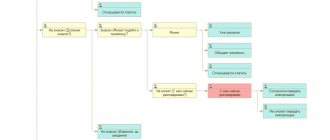Purchasing housing on the secondary market is a process associated with certain risks. For example, new owners may be faced with the problem of non-payment of housing and communal services by previous residents. Some people think that future residents will have to pay utility service representatives, although this is not the case. There is no legal provision that would place someone else's debt burden on the owner. But buying an apartment with debts on utility bills has nuances that you should find out about in advance.
Features of purchasing square meters with debts
There are no rules in the legislation of the Russian Federation that limit the possibility of selling housing with debts. In addition, the burden of debt for housing and communal services is not placed on the new owners of square meters, so there seems to be no reason for panic.
Expert opinion
Stanislav Ershov
Qualified lawyer. Ready to answer any of your questions! Ask them right now!
Write to an expert
But sometimes people are faced with the insistence of utility workers demanding that they pay off debts for the seller. Of course it's illegal, but no one wants trouble. Therefore, it is better to ask in advance whether all bills were paid by the former owner. If not, you can try to reduce the price. In addition, it is necessary to make changes to the standard text of the contract.
Features of purchasing square meters with the burden of rent debts are as follows:
- The debt is not tied to the living space, but to the individual.
- The only case when it is impossible to sell an apartment with debts is if, due to a large amount of debt, the utility companies filed a lawsuit and it came to the seizure of the living space.
- The ID period for the communal debt burden is 3 years. For example, if the owners have not paid their bills for 5 years, the housing and communal services service can recover money in court only for a three-year period.
- When the owner changes, the personal account changes.
- As soon as the owner receives documents certifying the right, the management company must be notified.
- If there are several organizations providing utility services, you will have to notify each one.
Despite the fact that no one prohibits the alienation of an object with debts, problems are possible in the process of registering property rights. Therefore, both parties are interested in resolving the debt situation as quickly as possible.
There are several ways to resolve the payment issue. A common option is when the cost of the apartment is reduced by the amount of the debt. When concluding a transaction, it is indicated that the buyer will pay it off himself. The parties can add the required clause to the text of the contract or draw up an additional agreement.
If the seller intends to pay the bills, you need to draw up a transfer document. It contains data on the amount of debt and readings from accounting devices.
In cases where the debt is not mentioned at all in the agreement, it follows the original owner automatically.
Rules for registering the transfer of rights
The following algorithm will help the buyer avoid problems and unpleasant proceedings with the management company and judicial authorities if there are doubts about the absence of debts for housing and communal services:
- Request from the seller an exhaustive list of documents for the alienated property (title documentation, extract of the Unified State Register, certificates).
- Studying the presented list will reveal whether there are legal restrictions on the re-registration of real estate to the new owner, or whether the property has been seized due to debts.
- Send a request to the management company or check on specialized websites about the situation with payments for the apartment in question. These requests will require consent for the disclosure of information to outsiders, however, if the current owner does not intend to facilitate the receipt of information, there is a high probability of risk. Refusal to provide documents confirming payment for utility costs is a serious reason to refuse the purchase.
- If unpaid bills are identified, it is necessary to include clauses in the contract being drawn up regarding the responsibility of the previous owner for debts that arose during the period of ownership of the property.
- Alternatively, a clause can be included in the contract establishing a discount when paying for an apartment, which will allow the new owner to pay off the resulting debt.
- After the issue of debt repayment is settled by agreement, the apartment is re-registered in the name of the buyer in Rosreestr.
- In the apartment acceptance certificate, a separate point is indicated where the meter data is recorded at the time of acceptance of the property.
An impressive list of securities is being prepared for the transaction , reducing the risk of a problematic transaction to a minimum:
- identification documents of the buyer and seller.
- extract from the Unified State Register.
- document from the Federal Tax Service confirming payment of property tax.
- a certificate from the FSSP establishing the right to re-register real estate.
- invoices and statements from the service organization, housing office office, service providers, indicating full settlement of payments.
- purchase and sale agreement (if there is a debt - with the inclusion of a separate clause establishing the responsibility of a specific party to the transaction for payment for consumed services;
- certificate, title document confirming the legitimacy of the disposal of property;
- certificate of residents, registered residents or their absence;
- a payment document confirming payment of a fee in the amount of 2 thousand rubles;
- acceptance certificate including information about meter readings;
- a receipt establishing the payment of funds in the amount specified in the bill of sale.
Ways to find out about debts
Before concluding a transaction, it is worth finding out whether the seller has a debt for utilities and how large it is. You can find out about the problem situation from the certificate requested from the seller. If the previous residents are in no hurry to bring the necessary piece of paper, there are other sources of information:
- Settlement centers open in most cities.
- Organizations supplying resources to consumers (heating, energy sales companies).
- Internet portals of management companies.
- Post offices that accept payments.
The buyer also has the right to use banking resources. For example, information about the presence of debts is provided by Sberbank PJSC. You can find out about the debt using the details that are on the receipts. When paying a bill in the terminal, the payer will immediately see the amount of debt at a specific address.
Using these methods, you can find out about the presence of debts for gas, electricity and other resources people need. We must not forget about paying for a landline phone, if you have one. Debts on it are of two types: for long-distance calls and for subscription fees.
How to check for debts before buying
In this case, you should not take the seller’s word for it. Before purchasing, it is possible to reliably establish that there is a debt on the apartment only using official documents.
There are several channels of information on how you can check for utility debts before purchasing a home:
- Ask the seller to provide a certificate of absence of debt on utility bills from the management company, homeowners association or other organization servicing the house. This is the main document you should rely on. The certificate must be signed by an accountant and certified by the seal of the organization. The validity period of such a certificate is only 5 days, since outside this period a new debt may be formed.
- If the living space receives not one, but several bills, for example, separately for water and separately for electricity, such certificates must be requested from all utility companies.
- Contributions for major repairs are paid on a separate receipt if the MKD account is managed by a regional fund. It is with the regional fund that before purchasing you need to clarify whether there is a debt on contributions for a specific apartment - management companies or homeowners associations will not be able to provide reliable information.
Note! The accounting department of the utility supply organization issues information only at the request of the current owner. The buyer is not provided with such certificates. Therefore, if the seller refuses to issue a certificate, it is possible that the apartment has a debt of many thousands, which will open after the purchase.
Using an extract from the Unified State Register of Real Estate, you can view records of bans or arrests related to debts that were collected through the court and sent to the FSSP for execution. Before purchasing, you can also check the presence of already “settled” debts for which enforcement proceedings are ongoing using the database of enforcement proceedings. For this:
- Fill in all search fields. You need to enter the name of the current owner of the apartment and his date of birth.
- Enter the code from the picture.
- If the owner has no enforcement proceedings, the picture will be as follows
- If there is a debt, then the database will produce the following result. However, the type of debt is not always indicated. These could be utility bills or any other obligations. In any case, there is a risk of imposing a ban on the alienation of the apartment.
How to react if the management company demands to pay someone else’s debt
If the issue with previous debts was not resolved in time, the management company may begin to remind itself. In this case, you need to write a statement demanding that you stop issuing invoices for the period preceding registration.
Such a complaint is written to the head of the organization. It must be accompanied by copies of an extract from the Unified State Register and the DCT. It is also advisable to bring the acceptance certificate with the recorded data of the accounting devices to the management company.
The package of documents can be given to utility workers in person or sent by registered mail. Within 30 days, the company must review the claim and provide a written response.
If the management company tries to collect debts even after the tenants apply, this may be regarded as extortion, and the new owners will have every right to go to court. Another way to restore justice is to complain to the district housing inspectorate. Suspension of services due to debts of the previous owners is also a violation of the law and is a reason for complaint.
What to do if the management company insists on payment?
A well-drafted agreement with the seller that includes a clause stating that the debt cannot be transferred to the buyer will help eliminate claims from utility companies The presence of such a clause in the deed of sale will protect against claims from the management company and service providers during the judicial review of the case.
An exception is the situation when the agreement with the management company or utility services indicates the legality of the transfer of debt. According to Art. 391 of the Civil Code, the seller can avoid liability for payment if the agreement with the management company contains specific provisions allowing the debt to be transferred to the new owner.
Faced with persistent demands from utility companies to pay bills for the previous owner, the buyer must take the following actions:
- Prepare documents establishing the rights to the object in question (purchase and sale agreement, certificate, extract from the Unified State Register).
- Submit a written statement requesting that debt amounts for previous periods be excluded from pay stubs.
- If the acceptance certificate contains information about the meter readings at the time the apartment was transferred to the new owner, a copy of it must also be attached to the application.
- The prepared package is sent by mail with notification, or personally taken to the representative office of the management company. After recording the fact of transfer of the appeal, any measures against the new owner will be illegal, and an attempt to force payment may lead to prosecution in accordance with Art. 163 of the Criminal Code.
Since after the transaction the relationship between the parties is considered completed, the seller has the right not to provide the new owner with information about his new place of residence and contact numbers.
Who should pay the debt?
A rule that should not be forgotten: if an apartment is sold with a rent debt, the debt remains with the previous owner. There is no rule that shifts the responsibility for paying the debt onto the shoulders of new residents.
On the contrary, there is full legal protection. According to the general principle of civil and housing legislation, rights and obligations arise at the time of conclusion of the contract.
In accordance with Art. 153 of the Housing Code of the Russian Federation, the obligation to pay for housing and communal services is assigned to a person only from the moment of transfer of ownership rights to him. All debts that were in the past do not apply to the buyer.
Thus, the obligation to pay for utilities is not tied to the facility. It is purely personal. The debt is assigned to the previous owner. That's what the law says.
Debts for major repairs are not included in the list. The new tenant will have to pay for major repairs regardless of his wishes or previous debts.
If the debts are only for utilities, then the apartment is safe. Almost
As already mentioned, debts for utility/housing payments are not registered with the apartment, but with the owner who has accumulated these debts. The new owner is not liable for the debts of the previous owner (Article 153, clause 5 of the Housing Code of the Russian Federation). In principle, a person does not lose anything by buying an apartment with outstanding utility debts. He will still build relations with the management company (or HOA) from scratch, and let the utility workers deal with the previous owner themselves. However, most buyers require that debt issues with their future apartment be resolved before transferring ownership. At least to avoid an unpleasant conversation with the house manager.
Lilia Kabischa
residential real estate expert
Now our client is buying an apartment, the owner of which owes 200 thousand for utilities. Electricity and water are cut off and no one lives there. But there are no seizures or restrictions on alienation on the apartment, so sale is possible. Cash purchase. One of the co-owners of the apartment is a child, so the transaction is formalized through a notary. We plan to carry out the transaction according to the following scheme: on the day of the transaction, we take a certificate from the Unified Center with the exact amount of the debt, the seller takes exactly this amount from the buyer as a targeted loan to pay off the debt; Together we visit the Sberbank office, where the seller pays the debt. After this, we go to the notary, where the parties enter into a purchase and sale agreement. The amount already transferred to the seller will be taken into account in the final payment. If the transaction were not notarized, then the purchase and sale agreement could be signed directly at the Sberbank office.
As Liliya Kabischa notes, theoretically, the seller of an apartment, after paying off the debt for the utility bill, may refuse the transaction, especially if the money is transferred in advance, not on the day of signing the sales contract. And then the failed buyer will have to recover the same 200 thousand from the seller through the court. But in this particular situation, the seller himself took a long time to reach this transaction (including spending time and effort on coordinating the sale with the guardianship authorities). That is, he clearly showed that he was interested in selling this apartment.
Ksenia Shashkova
lawyer at the Dragee real estate agency
This is a normal practice when utility debts accumulated by the seller of an apartment are repaid at the expense of the buyer. Most often, in order to avoid any “change of mind”, the seller receives money - including for repayment of debt - only after signing the purchase and sale agreement. Moreover, the contract states that a certain part of the amount received by the seller is intended to repay the debt. This scheme works reliably, including if payments between the buyer and seller are made through a letter of credit, which is the most popular payment instrument today.
How not to pay legally?
The law establishes a number of utility services that must be paid. These are electricity, gas, water supply, sewerage and heating. Failure to pay will result in penalties and interest.
Let's consider whether it is possible not to pay a penalty. The accrual of penalties can only be challenged in court. The applicant must prove that the amounts were calculated incorrectly.
If the court takes into account the applicant’s evidence, the amount will be reduced or written off completely.
At the same time, a number of payments are established that cannot be increased due to penalties. In case of non-payment, the service provider simply stops providing the service until payment is made. Such services include an elevator, antenna, radio, intercom, Internet, home telephone.
Let's look at why you don't have to pay for some housing and communal services. Not all owners need certain services. If you do not need cable television or the Internet, then you can simply stop making payments by first terminating the supply agreement. This will reduce charges and save part of the family budget.
If the check didn't help
It happens that even a competently carried out inspection of the apartment cannot protect the buyer of the apartment from other people’s debts.
Nikita Slovikovsky
director of the real estate agency "Dragee"
Here's how it happens. Before the transaction, a person receives certificates of absence of any debts, and then he receives receipts with huge amounts of payments. We encountered this only once ourselves, but I heard that similar stories happened to colleagues from other agencies. It turned out that the previous owner of the apartment, which is serviced by the HOA, did not receive receipts for payment for major repairs for some time. Then they began to arrive, but they indicated only current amounts, without taking into account the accumulated debt. The man sold the apartment to our client. The absence of debt for major repairs was confirmed by the latest receipt and certificate from the HOA. And then, before the New Year, the capital repair fund and the HOA began to balance the balance and found a period when no payments were made for this apartment. The new owner received a receipt with a debt of 30 thousand rubles. The owner refused to pay.
As explained in Drazhe AN, this case falls under the agency’s warranty obligations, so the client (the new owner of the apartment) was first helped to draw up a pre-trial claim against the HOA, and now they are representing his interests in court (at no additional cost).
Ksenia Shashkova
lawyer at the Dragee real estate agency
There is a failure by the HOA to fulfill its obligations to collect payments. The debt fell on the new owner due to the fault of the HOA. If it had sent receipts on time, there would not have been a problem. In addition, the statute of limitations for the unpaid amount has expired - 3 years. I think that the court will decide the case in favor of the buyer of the apartment.
What are the risks of purchasing real estate with housing and communal services debt?
Debt on utility bills of the former owner of square meters raises natural concerns among potential buyers. Late payment for housing and communal services carries a number of risks:
- the management company will try to demand payment of the debt from the new owner;
- resource suppliers can turn off electricity, gas, water for non-payment;
- in the future, the seller may be declared bankrupt (especially if there are outstanding loans);
- Debts for major repairs will have to be repaid by the new owner; they are tied not to a person, but to an object.
Debts for housing and communal services in themselves are not dangerous for the buyer if the transaction is carried out correctly and loopholes in the purchase and sale agreement are eliminated. However, large debts should alert you, since it is possible that you may have other debts. If the seller is declared bankrupt within three years after the transaction, it may be declared invalid, obliging him to return the apartment.









